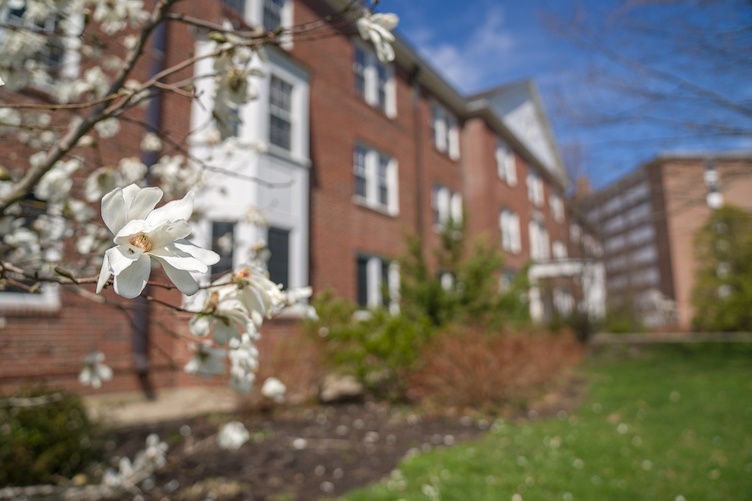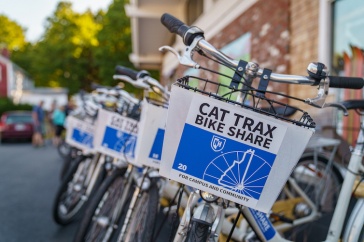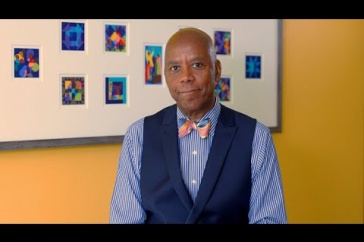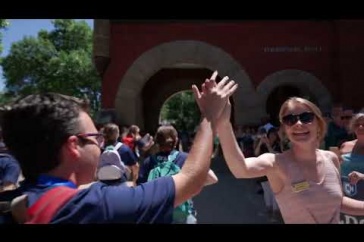
Every Monday and Wednesday evening at 7 p.m., Peterson Hall director and former UNH football running back and co-captain Trevon Bryant ’18 leads a group of students through a 45-minute Wildcat-worthy workout that includes pushups and squats, jumping jacks and burpees. On Tuesdays, Englehardt Hall director Jhenneffer Marcal ’18 hosts a “Bob’s Burgers” burger night. Stoke Hall director Christine Roundtree is putting on weekend scavenger hunts, Tuesday tea parties and Wednesday lunches. And on Thursdays, all three square off for a fiercely competitive inter-dorm trivia contest that Bryant proudly notes Peterson Hall has won for two weeks and counting.
UNH’s residence halls may now stand empty, but the hall directors who run them recognize what an integral role community living plays in students’ college experience — perhaps now more than ever before. That’s why they and others are marshaling their creativity and leveraging online tools like Zoom and Instagram Live to offer community-building activities they’d be hosting if their charges were down the hall and not scattered at homes across the United States.
Marcal says when the university went remote, hall directors had about a week to pull together ideas for new ways to connect with their students. “It’s been very much a group effort, with all of us diving into one another’s strengths to make it work,” she says.
Roundtree says one of the critical needs was to create a sense of structure. “That’s what we’re finding our students miss and need most,” she says. “We can’t replicate the campus experience, but it’s something.”
And it’s not just the UNH residence hall staff who’s reaching out.
At Health & Wellness, walk-in appointments may no longer be an option for students, but they can schedule weekday telehealth appointments with healthcare providers Monday through Friday. Via Zoom, students can get help with non-emergent concerns or questions, wellness coaching, nutrition education and counseling and education around alcohol, nicotine and other drugs. (Telehealth appointments are covered by students’ health fee.) Elsewhere at Health & Wellness, students, faculty and staff alike can take advantage of virtual self-care workshops, which are being hosted on Facebook Live and Zoom. From two-minute stress relievers to napercize, meditation to intuitive eating, these programs provide critical connections and an emotional outlet for participants — and the staff members conducting them.
Roundtree says one of the critical needs was to create a sense of structure. “That’s what we’re finding our students miss and need most,” she says. “We can’t replicate the campus experience, but it’s something.”
“These are challenging times for all of us, and that impacts our well-being and therefore our academic, work and home lives,” says Health & Wellness Director of Education Kathleen Grace-Bishop. “We may not be able to control many things happening right now, but we can choose how we respond, and one of our choices can be to care for ourselves and learn to be more gentle with ourselves and each other. Our workshops and daily recharge provide opportunities to learn and practice various skills for self-care and to see we are not alone with our experiences.”
UNH Psychological and Counseling Services (PACS) has gone so far as to send students a “virtual care package”: a compendium of PACS-specific services as well as links to external online mental health resources, information about COVID-19 and more. “We’re considered an essential service, so PACS has not closed,” explains PACS Director Shari Robinson. “We have kept in place limited leadership and support staff who are answering the phones and are available for phone consultation or onsite same day urgent appointments.” For existing clients who have an acute and/or ongoing need for more personalized mental health support, PACS is also available for face-to-face distance counseling sessions via video. “Like everyone else, PACS is trying to mitigate the risk of exposure for our students and ourselves,” Robinson notes.
One PACS initiative that’s both minimizing exposure and expanding access is a new program called WellTrack. Launched in mid-March, WellTrack is a suite of online tools and course modules that use aspects of cognitive behavioral therapy to help individuals’ identify, understand and address their own behavioral health issues. The tool is free and available to anyone with a UNH.edu email address.
For Lu Ferrell, interim director of the Office of Multicultural Student Affairs (OMSA), outreach to students is about continuing to support the sense of community OMSA and the Connect program fostered on campus, and to that end they’ve been collaborating with Connect program coordinator Funmi Oyekunle and Isaiah Iboko, OMSA’s multicultural coordinator, on virtual community “hang outs” for students.
“We’re hosting weekly Zoom processing and check-in sessions to address the sudden transition and change that happened when the university closed,” Ferrell explains. “We work with students who may now be in an environment that isn’t safe or welcoming, and we know seniors, in particular, may be dealing with stress and disappointment about the way their college experience is ending.” Ferrell says some 20-30 students have joined them for each of the Friday noontime sessions that have taken place since the campus closed in mid-March.
Jamie Silverstein, who is UNH’s coordinator for Fraternity and Sorority Life (FSL), is similarly focused on recreating the sense of community students have enjoyed as members of the university’s FSL community. “I’ve been working with my students to focus on community, retention and engagement at this time rather than stress about programs that will not get completed or events they are no longer able to put on or be a part of,” says Silverstein, who’s been holding Zoom meetings, one-on-ones and educational sessions. “They are focused on being kind, caring about themselves and others, and being supportive friends.”
Like Silverstein, Peterson Hall director Trevon Bryant is sanguine about how students are handling the unexpected changes in their college experience. “For the most part, they’re really doing well,” he says. “They still need that peer-to-peer contact, which is something we’ve been able to help provide. We’re all here for one another other.”
-
Written By:
Kristin Waterfield Duisberg | Communications and Public Affairs



















































